On Lake Tanganyika
It's not surprising this lake was one of the centres of 19th century African exploration. It's almost like an inland sea. So I visited Ujiji and the David Livingstone monument.
Some photos from the site:
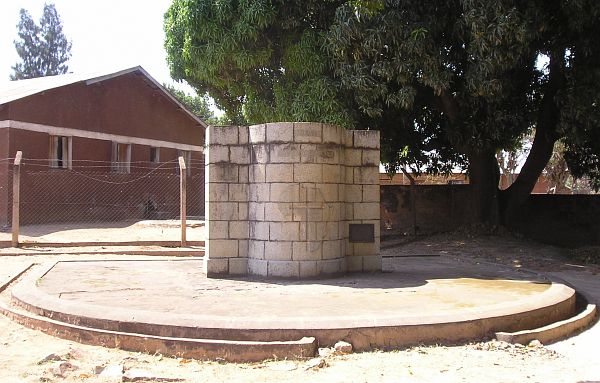
Livingstone monument. Small museum behind.
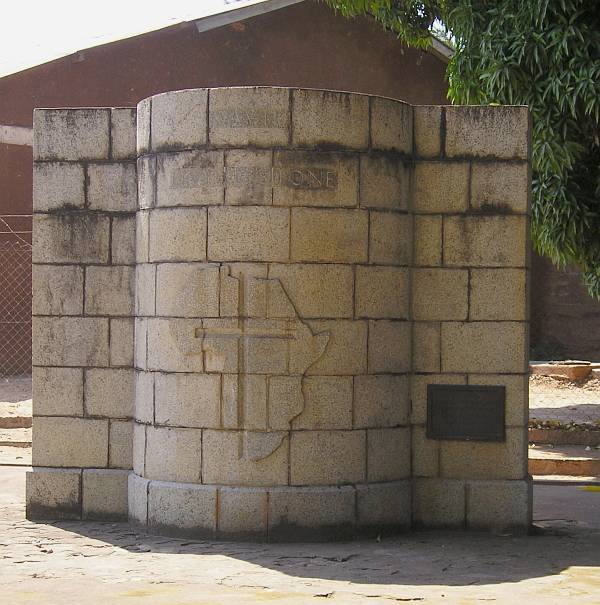
The inscription above the outline of Africa says "David Livingstone."
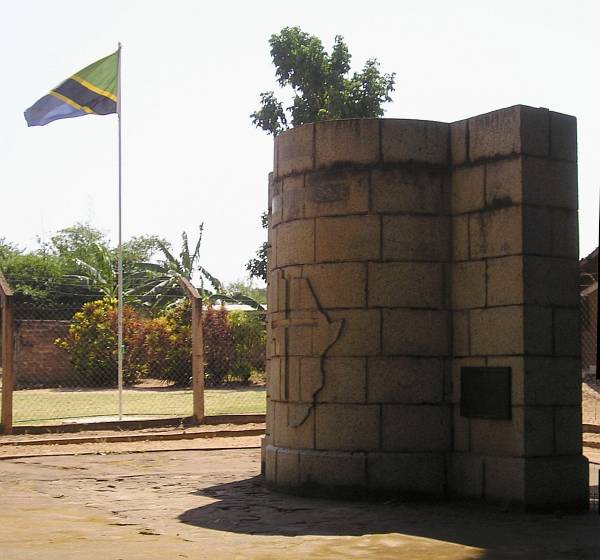
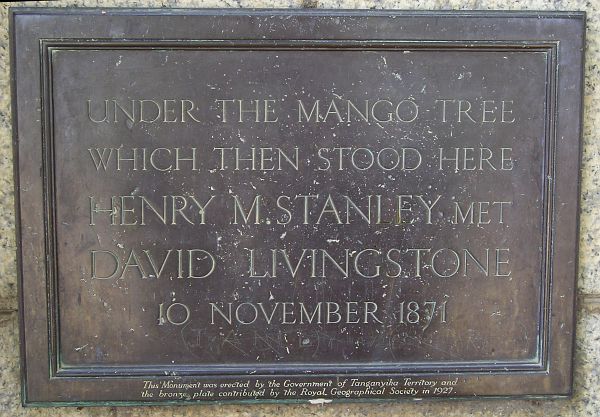
Bronze plaque on the right of the monument, contributed by the Royal Geographical Society in 1927.
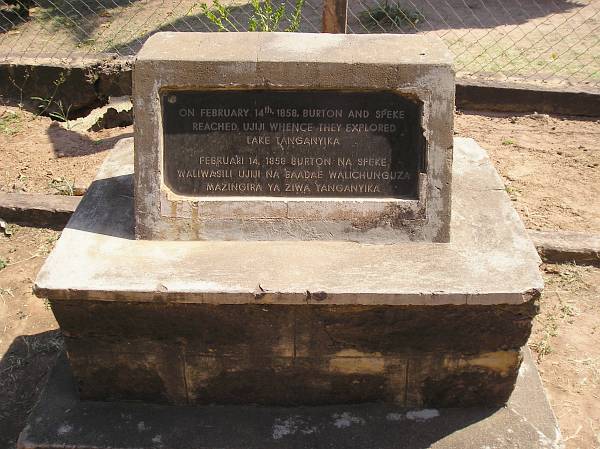
The Burton - Speke monument in the same compound.

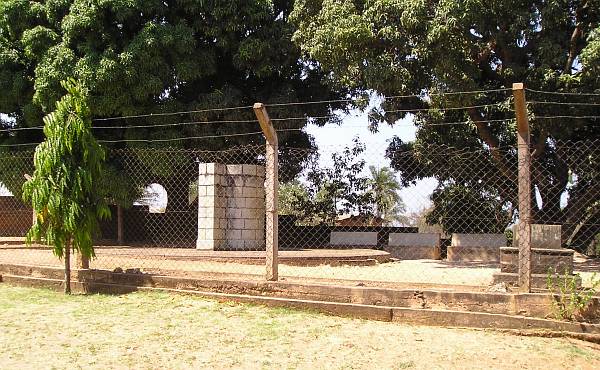
The compound. Burton - Speke monument on the far right.
It seems that back in 1871 the lake shore was right here by the monument. Now it's 800 yards away as the waters have receded. The sandy town of Ujiji is right on the water's edge, so it too must have moved over the years.
If I read the information in the rudimentary museum correctly (but it did have some interesting photos and an original manuscript letter from Livingstone saying how depressed he was through illness and the activities of slave traders in the area), he died in a hut near here. And according to newspaper cuttings on display there's quite a dispute about the route his body took to return to the sea, and home.
I'm fairly certain about my immediate onward route, even more so now after an interesting chat in a restaurant on Thursday night.
I went to the one bar that's reasonably within walking distance. Yes, there's food they told me so I took a table. It was all out in the open air.
Immediately two local men called over, "Look, we're strangers from other places, do it the African way, take a seat here."
So I did.
Roy was a civil engineer from the opposite corner of Tanzania working on a project in Kigoma. His new-found friend, who's name I've already forgotten and could never spell anyway, had also just arrived at the bar, and was an economist with the local government in Kasulu, where I'd stayed before arriving in Kigoma.
"We've both stayed in England, you're a strange crowd there, going into bars and sitting on your own!" said Roy. "We don't do that here."
Roy's friend explained that he had arrived in town that morning for the local-government conference, which was the event going on that I'd heard about.
"I came into this bar about an hour ago, met Roy, decided I'd rather stay here the night instead of going home, and already Roy's found a place for me to stay. His driver will be here soon to take me there."
"I've stayed in England," he continued, "I did my degree at London University. How long would it have taken me to find a place to stay over there? Impossible!"
I replied that I worked for quite a while in the same area, even used the university swimming pool lunchtimes.
"Has it changed much since 1998 when I was there?"
"Have you got a couple of days to hear about it?" I replied.
They were interested in my journey, whereupon Roy said, "I saw a visitor yesterday in town, riding a little motorbike with so much luggage on it it took up more room than him. I thought - another crazy foreigner!"
"That was probably me."
Roy offered a description.
"Yep, that was me."
"Well, good luck to you!"
Later, after they'd made sure I paid the local's price for my dinner, not the foreigner's price, and Roy's driver had come to take his friend to his overnight lodgings, I asked Roy what project he was working on.
"Well, you rode on it."
It was the fifteen miles of tarmac leading into town. Snaking down the steep escarpment, over about five bridges, and most of it four lanes wide.
"It's been eighteen months, but almost finished now. I should be home in three weeks."
Either he didn't know why it was four lanes wide (plus shoulders) or he wasn't saying, but the width was a surprise to me after the preceeding thirty miles of dirt from Kasulu which was a lane and a half wide, no shoulder.
"The President was here a couple of months ago, saying there was enough money in the kitty to extend it all the way to Kasulu. So I may be back."
"Any chance of that being done by Monday?" I tentatively enquired.
"About the same as England ever winning a World Cup again!"
So there you have it. I now know the builder of the first fifteen miles of runway-quality tarmac out of Kigoma, and that it'll still be 180 miles of dirt thereafter.
You come across huge quantities of optimism in Africa, and these two characters were the embodiment of it.
I haven't had much of a break here yet. Thursday was getting oriented, finding an internet place, visiting Ujiji, and looking at other hotels (the place I'm in said they would be full on Friday, but now they're not, so I'm still here). Friday was bike servicing and repair day, so I may stay until Monday.
You can get used to these sunsets from your bedroom window. Here's another:
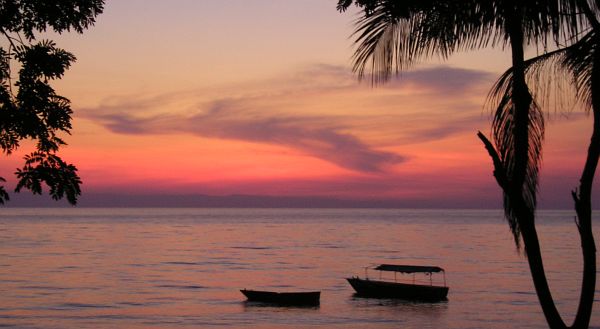
On the way here, on the long dirt road, I thought I heard some new noise from the bike. Difficult to tell with all the road bumps and luggage shaking. Probably just paranoia again. But no, something was going on, and eventually I decided it could be chain noise. But I'd oiled and checked it in Kigali and all was ok.
So I stopped for a check and thought of the guide roller, that fell off in Egypt's Western Desert. It's well hidden behind lots of luggage so it's easily forgotten.
Sure enough it didn't look quite right, it looked like the rubber had parted company from the bearing.
So another chore on Thursday was looking for a place selling rubber hose. It might be useful for a repair. But I found none.
And on Friday I removed it, to find the new journal bearing fitted in Aswan had collapsed.
In fact it now looked the same as the old bearing I replaced in Aswan. The steel dust seals had disintegrated and the cage was broken in a couple of places.
Suddenly I realised that the old bearing, back in Aswan, that I thought was a bicycle wheel style item that should never really have been fitted, was in fact originally a proper journal bearing which had also collapsed, the seals and cage having completely disappeared.
Memories of an internet forum on TTR250s came back, with people saying they had completely discarded the guide roller because they broke too easily. And even a vague memory of someone finding a much better replacement, in Australia I think.
So it was now obvious to me that this guide roller is a bit of a weak point. The bearing has no lubrication, is out in the open being constantly clobbered by the chain, specially on dirt roads, so can't last very long.
The rubber roller was also a bit battered. I used some special rubber tape I had to make the roller a tighter fit on the remains of the bearing, fitted an extra thrust washer to take up the slack, stuffed the bearing full of grease and bolted it all back.
So we'll see how it looks when I get back to Nyakanazi and tarmac roads.
While at it, on the left hand side of the bike, I changed the spark plug. I thought maybe the higher altitude running might improve with a new one, as the old plug has now done 13,000 miles, the total mileage since Whyteleafe.
One thing led to another, and the fuel filter is on the left hand side, so I removed that as well to fit a new one.
Then a senior moment. I thought I had checked that both petrol taps were off first, so couldn't understand why petrol gushed out of the disconnected filter and wouldn't stop. I checked the taps again, one each side of the petrol tank. I found the left hand one switched to reserve, despite the big stickers I had put on the tank showing which way was 'On', 'Off', and 'Reserve'. How long it had been like that I don't know but it must have been a long time. And between the Rwandan border and here there were very few petrol stations, with long stretches between. I was glad I had filled up everytime rather than rely on my reserve supply, because there wouldn't have been one! Will have to remember to get that right next time I use that left hand tap.
I've been conscious of the need to have a clean air filter with the bike running rich at high altitude, but the road here made that all but impossible.
When a bus or truck goes past in the opposite direction, the dust cloud really is impenetrable. I even saw more than one motorbike rider wearing an industrial style breathing mask - they probably ride this road everyday.
I found that you have no option but to stop when something comes the other way, otherwise for a short while visibility is absolutely zero. So I turn the engine off to stop all the dust being sucked in.
Then I realised, while I was stationary waiting for the air to clear, that most other road users were doing the same, that is, pedestrians and cyclists, temporarily stopped and using a cloth or scarf to breathe through.
But what about a slow lorry in front? When you catch up with one, there's no choice but to overtake. You can't follow, you'll not be able to breathe after a while, nor will the bike.
So you have to choose your moment when the wind blows the dust a bit away from the overtaking path, try to make out if the surface is OK, and go. But the great clouds of dust billowing from the lorry's nine huge wheels (or more if it's a double trailer) still chokes everything, including visibility and my air filter.
But after a while on this road I learned that the lorry drivers follow a nifty convention. I noticed a couple of times, with nothing coming the other way, that a slow lorry ahead would keep to the right hand side of the road. After double checking what country I was in and confirming to myself, yes we are driving on the left, I noticed that the wind was blowing from left to right, keeping the left hand side of the lorry relatively clear of dust and making overtaking (on the inside) a safer possibility.
A pretty good idea and another African lesson to remember, but only of use when the wind is blowing across the road. Mostly there's no wind.
So am now taking a proper break, that is, nipping into town for a haircut. I saw three barber shops together on the way in, all with fancy African signs outside, "Specialists in All Styles," and went back there. But it's Saturday and two were closed, the people in the drapery shop showed me the one that was still open.
The haircut, with all the detailed attention that seems to come with one in Africa, (although explaining things here isn't straightforward, only a few people speak English, then it's fairly limited), came to the princely sum of seventy-five pence!
I thought I had read somewhere that Tanzania is relatively expensive, but here in the far west that doesn't seem to be the case.
The hotel is nine pounds, for a big room like this:
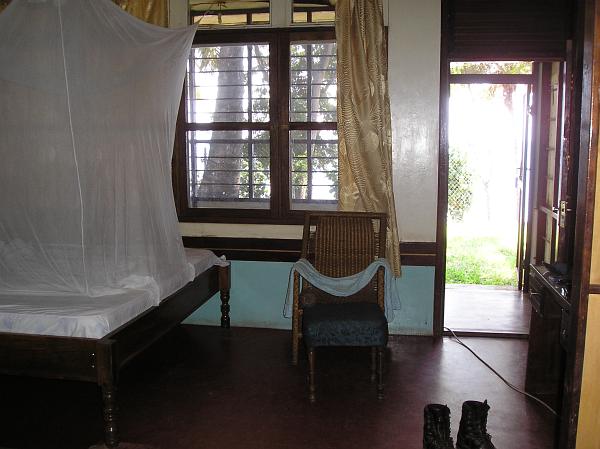
Opening out onto the beach here:
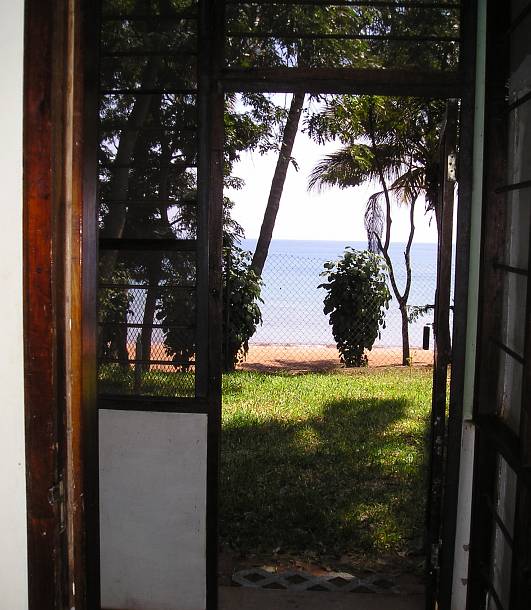
.... via the screened terrace here:
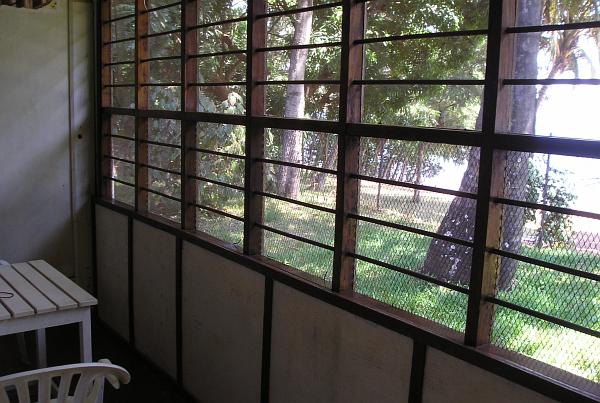
Sunsets as before, over the lake:
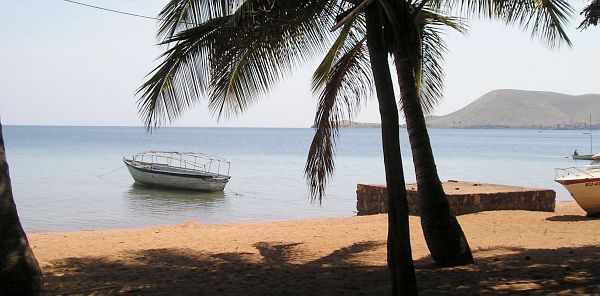
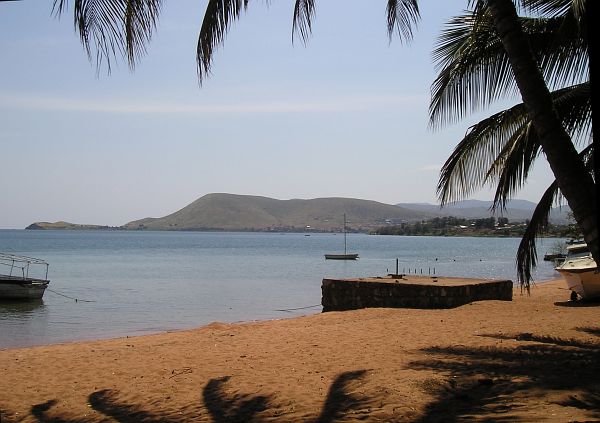
And VIP shaded parking for my bike just by the beach entrance.
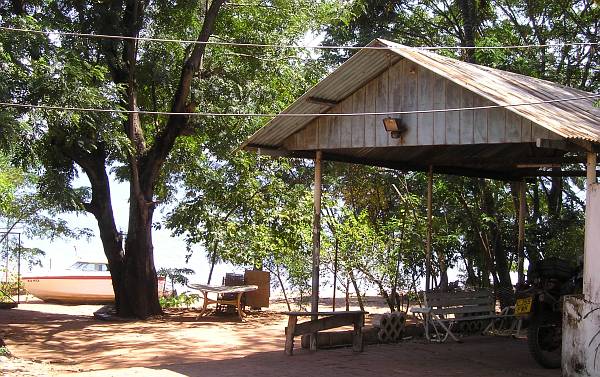
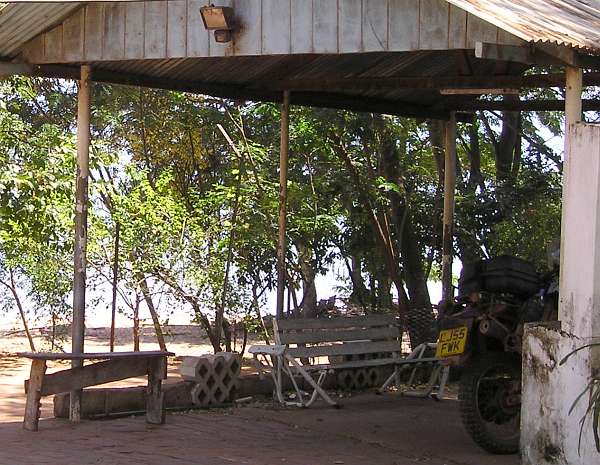
View from the beach in the other direction:
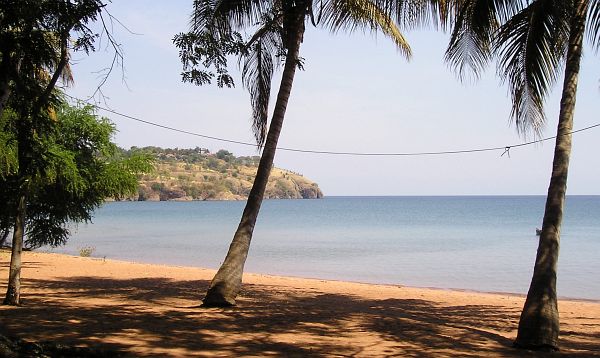
On the top of the headland there's a hotel which is expensive, USD60 per night they say, and restaurant to match.
So I tried the restaurant for my day off. Very smart and upmarket, three courses, two beers, endless views, for eight pounds. There are cheaper places in town, dinner for under two pounds, but there's only meat and chips, or meat and ugali (African maize meal), available. No vegetables. Sometimes you need a bit more. The eight pounds up there gets you two beers, big salad for starters and lots of vegetables, and ice cream!
So will stay a little longer maybe.
Here's a little more of Lake Tanganyika from up at the posh hotel:
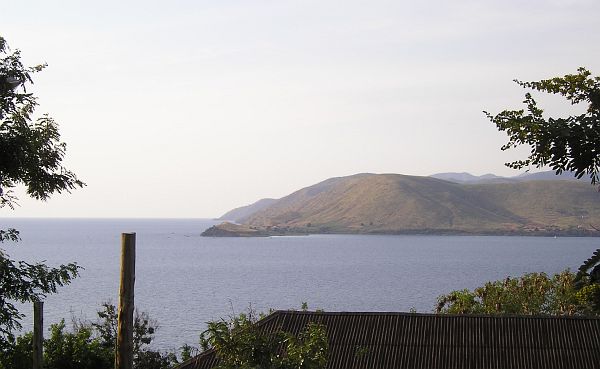
Looking north to the far side of the bay. Kigoma is over to the right inside the bay, Burundi straight ahead in the far distance, Congo way over to the left out of sight. You have to be up on the escarpment to see it.
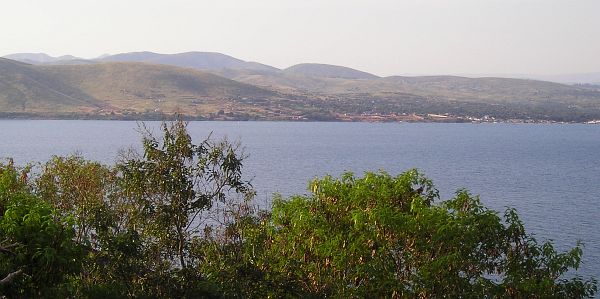
Further into the bay. Outskirts of Kigoma on the right.
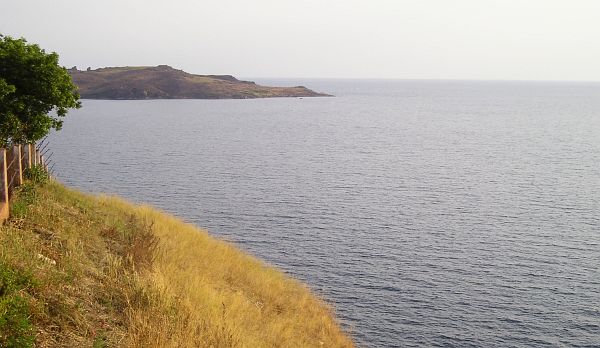
Looking south. Ujiji just beyond the headland. Congo way over to the right.
